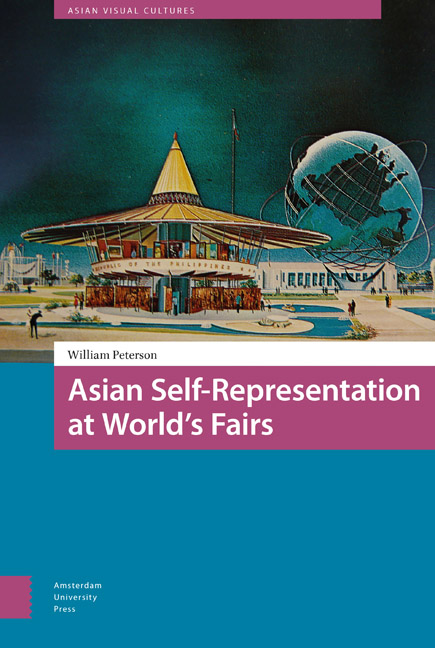Book contents
- Frontmatter
- Dedication
- Contents
- List of Figures
- Acknowledgements
- Note on Works Cited
- Note on Asian Names
- 1 Introduction: Setting the Stage
- 2 The Master of the Form: Japan at San Francisco's 1915 Panama-Pacific International Exposition
- 3 The New China and Chinese-Americanness: China at San Francisco's 1915 Panama-Pacific International Exposition
- 4 Performing Japan in the ‘World of Tomorrow’: Japan at the 1939-1940 New York World's Fair
- 5 From ‘Panda Diplomacy’ to Acrobat Diplomacy: China at the Brisbane's Expo ‘88
- 6 Fashion, Dance, and Representing the Filipina: The Philippines at the 1964-1965 New York World's Fair
- 7 Performing Modernity under Sukarno's ‘Roving Eye’: Indonesia at the 1964-1965 New York World's Fair
- 8 Maximizing Affect, Minimizing Impact with Hansik: South Korea at the 2015 Milan International Exposition
- 9 Hard and Soft Power in the Thai Pavilion: The Spectral Presence of King Bhumibol at the 2015 Milan Exposition
- 10 Conclusion: The Future of Asian Self-Representation at the International Exposition
- Works Cited
- Index
5 - From ‘Panda Diplomacy’ to Acrobat Diplomacy: China at the Brisbane's Expo ‘88
Published online by Cambridge University Press: 21 November 2020
- Frontmatter
- Dedication
- Contents
- List of Figures
- Acknowledgements
- Note on Works Cited
- Note on Asian Names
- 1 Introduction: Setting the Stage
- 2 The Master of the Form: Japan at San Francisco's 1915 Panama-Pacific International Exposition
- 3 The New China and Chinese-Americanness: China at San Francisco's 1915 Panama-Pacific International Exposition
- 4 Performing Japan in the ‘World of Tomorrow’: Japan at the 1939-1940 New York World's Fair
- 5 From ‘Panda Diplomacy’ to Acrobat Diplomacy: China at the Brisbane's Expo ‘88
- 6 Fashion, Dance, and Representing the Filipina: The Philippines at the 1964-1965 New York World's Fair
- 7 Performing Modernity under Sukarno's ‘Roving Eye’: Indonesia at the 1964-1965 New York World's Fair
- 8 Maximizing Affect, Minimizing Impact with Hansik: South Korea at the 2015 Milan International Exposition
- 9 Hard and Soft Power in the Thai Pavilion: The Spectral Presence of King Bhumibol at the 2015 Milan Exposition
- 10 Conclusion: The Future of Asian Self-Representation at the International Exposition
- Works Cited
- Index
Summary
Abstract
After a long absence from the international exposition stage, China (now the People's Republic of China or PRC) under the leadership of market-friendly Deng Xiaoping, sought to leave a strong, positive impression on its Australian neighbors at the Brisbane ‘88 Expo. Australia was one of the first Western nations to deepen its relationship with China in the post-Mao era, and by 1988 the Australian public was enthralled by the ‘terracotta warriors’ and their acrobatic troupes, long a centerpiece of cultural diplomacy. China's modes of self-representation reflected what Australian admired about the country and just a year before Tiananmen, the PRC offered up a play banned during the Cultural Revolution (1966-1976), hinting at a more open, democratic future that was not to be.
Keywords: Chinese acrobats, Australia, Beijing Opera
In the post-World War II era, it soon became clear that military force, diplomacy, and commerce were not themselves fully sufficient to advance an ambitious nation's interests on the international stage. At the height of the Cold War and continuing into the 1960s, as the US and the USSR emerged as the two competing global superpowers, the US sought to extend its power through the attractiveness of its popular culture – notably rock and roll and youth culture – while on the high culture side it promoted the abstract expressionism in the visual arts and modern dance as appealing markers of American cultural vibrancy. Joseph Nye, writing of America’s use of such cultural resources to generate a more favorable image of itself internationally, famously termed this ‘ability to attract’ ‘soft power’ (2004, p. 6). Nye's framework, which will be invoked in future chapters as well, is relevant in considering the resources that China, or the People's Republic of China (PRC), employed to win the hearts and minds of not just politicians, but ordinary citizens in the West from the 1970s onward.
Ten years after the death of the senior leaders of the revolution, Mao Zedong and Zhou Enlai, China under Deng Xiaoping sought to embrace a kind of ‘Socialism with Chinese characteristics’ 中国特色社会主义, a concept that in practice came to mean a kind of state-directed capitalism.
- Type
- Chapter
- Information
- Asian Self-Representation at World's Fairs , pp. 139 - 166Publisher: Amsterdam University PressPrint publication year: 2020



